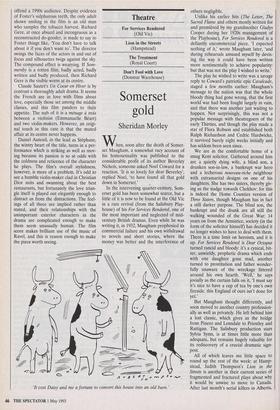Theatre
For Services Rendered (Old Vic) Lion in the Streets (Hampstead) The Treatment (Royal Court) Don't Fool with Love (Donmar Warehouse)
Somerset gold
Sheridan Morley
When, soon after the death of Somer- set Maugham, a somewhat racy account of his homosexuality was published to the considerable profit of its author Beverley Nichols, someone asked Noel Coward for a reaction. 'It is so lovely for dear Beverley', replied Noel, 'to have found all that gold down in Somerset.'
In the intervening quarter-century, Som- erset gold has been somewhat scarce, but a little of it is now to be found at the Old Vic in a rare revival (from the Salisbury Play- house) of his For Services Rendered, one of the most important and neglected of mid- century British dramas. Even while he was writing it, in 1932, Maugham prophesied its commercial failure and his own withdrawal to novels and short stories, where the money was better and the interference of 'It cost Daisy and me a fortune to convert this house into an old barn.' others negligible.
Unlike his earlier hits (The Letter, The Sacred Flame and others mostly written for and premiered by my grandmother Gladys Cooper during her 1920s management of the Playhouse), For Services Rendered is a defiantly uncommercial piece. 'I expected nothing of it,' wrote Maugham later, 'and during rehearsals amused myself by devis- ing the way it could have been written more sentimentally to achieve popularity: but that was not the play I wished to write.'
The play he wished to write was a savage reply to Coward's patriotic epic Cavalcade, staged a few months earlier: Maugham's message to the nation was that the whole bloody thing had gone wrong, that the first world war had been fought largely in vain, and that there was another just waiting to happen. Not surprisingly, this was not a popular message with theatregoers of the early Thirties, and though the play made a star of Flora Robson and established both Ralph Richardson and Cedric Hardwicke, it survived barely eight weeks initially and has seldom been seen since.
We are in the comfortable home of a smug Kent solicitor. Gathered around him are a quietly dying wife, a blind son, a drunken son-in-law, a bankrupt war hero and a lecherous nouveau-riche neighbour with extramarital designs on one of his daughters. She has two sisters, thereby giv- ing us the nudge towards Chekhov: for this is indeed the Home Counties version of Three Sisters, though Maugham has in fact a still darker purpose. The blind son, the bankrupt and the drunk are all still the walking wounded of the Great War: 14 years on from the Armistice, society (in the form of the solicitor himself) has decided it no longer wishes to have to deal with them. There is a time limit on heroism, and it is up. For Services Rendered is Dear Octopus turned rancid and bloody: it's a cynical, bit- ter, unwieldy, prophetic drama which ends with one daughter gone mad, another turned to prostitution and father wonder- fully unaware of the wreckage littered around his own hearth. 'Well,' he says jovially as the curtain falls on it, 'I must say it's nice to have a cup of tea by one's own fireside: this England of ours isn't done for yet.'
But Maugham thought differently, and soon moved to another country profession- ally as well as privately. He left behind him a lost classic, which gives us the bridge from Pinero and Lonsdale to Priestley and Rattigan. The Salisbury production stars Sylvia Syms, is at times little more than adequate, but remains hugely valuable for its rediscovery of a crucial dramatic sign- post.
All of which leaves me little space to round up the rest of the week: at Hamp- stead, Judith Thompson's Lion in the Streets is another in their current series of fragmented and fractured plays about why it would be unwise to move to Canada. After last month's serial killers in Alberta, we now get loonies in Toronto trying to make sense of alienated lives and loves.
Not that things are a lot better in Man- hattan: Martin Crimp's The Treatment at the Royal Court is the story of an abused wife (Jacqueline Defferary) who in the pro- cess, admittedly dubious from the outset, of trying to sell her story to Hollywood gets still further abused by a couple of agent- producers. Crimp's nightmare of American showbiz values becomes a latterday Lear, full of the blind leading the blind, but it is dominated by Sheila Gish as the all too familiar American wife from hell in the padded power shoulders.
For an escape into a no less savage past, Declan Donellan brings his Cheek by Jowl players back to the Donmar Warehouse with Don't Fool with Love, de Musset's tragedy of lost love and life in rural France of 1835: a triumph of style over substance.



























































 Previous page
Previous page